As a 501(c)(3) organization, Trout Unlimited cannot endorse any political candidate, but that doesn't mean TU can't campaign for the issues that matter to us. Through TU's Sportsmen Conservation Project (SCP), the voice of anglers and sportsmen are being represented all over Colorado to ensure that public lands pristine to fishing and hunting, are kept in public hands.
SCP is currently working on campaigns all over the state to protect areas important to sportsmen and women. These campaigns range from providing ideas and visions to local agencies during planning processes, helping protect areas from irresponsible use, keeping areas wild and native, and just offering a voice for anglers and hunters.
Rio Grande Watershed
Planning for the management of 1.8 million acres of the Rio Grande National Forest is no small task. The Forest has officially begun its revision process of the 1996 Rio
Grande National Forest Plan. This plan revision is the first of its kind in Colorado since the adoption of the 2012 National Planning Rule. In the plan revision is the opportunity to participate in the next 15 plus years of management on Colorado's largest tract of National Forest. Trout Unlimited has already participated in many different levels and is currently putting forward a “Sportsmen’s Vision” for the forest which focuses on hunting and fishing resources, and puts watershed health and native fish first as a management priority. For more information on the Forest Plan Revision process on the Rio Grande NF, go to http://trout.maps.arcgis.com/apps/MapJournal/index.html?appid=ee32de170ad3433abd61485987a5ec09 (Please contact Garrett Hanks for more information).
Thompson Divide
The Thompson Divide is a pristine 221,500 acres of federal land in Pitkin, Gunnison, Garfield and Mesa counties south of the Roaring Fork Valley. Thompson Divide contains some of the state's best habitat for big game, cutthroat trout and numerous other species. Tens of thousands of big game hunters practice their passion in the timber and meadows of the Thompson Divide every year. The Divide is also home to the headwaters of several of the most popular fisheries in the state including the Roaring Fork, Crystal and the North Fork of the Gunnison.
In order to help keep the Thompson Divide free from energy development, Trout Unlimited created Sportsmen for Thompson Divide to provide a sportsmen’s voice to the effort and work with a coalition with an array of interests to protect the area permanently. The BLM is expected to announce their decision to cancel the leases within the Thompson Divide late fall of 2016.
While the canceling of these leases is a victory for sportsmen, the effort needs to continue on in order to ensure permanent protection for the Thompson Divide. TU is working with and encouraging the counties and politicians to introduce and support legislation that will keep the Thompson Divide from being offered for mineral lease permanently once what is expected to be a favorable Record of Decision from the BLM is announced. (Please contact Tyler Baskfield for more information).
Upper Gunnison Watershed
A Public Lands workgroup of Gunnison County has been meeting monthly in 2016 to discuss the possibility of expanded permanent protections of lands in Gunnison County. Trout Unlimited has a representative on the committee and originally submitted a proposal to the workgroup for consideration. TU’s asks center around Sportsmen’s Emphasis Areas and protecting cutthroat watersheds. For more information, check out this summary from the Gunnison Public Lands Initiative: http://www.gunnisonpubliclands.org/workinggroup (Please contact Garrett Hanks for more information).
South Park MLP
South Park may be one of the most popular places in Colorado for sportsmen of all kinds to practice their craft due to it's world renowned public fishing opportunities, big game herds and vital source of drinking water for Front Range residents.
South Park is currently undergoing a Master Leasing Plan by the BLM. This type of planning focuses on ensuring oil and gas development on public lands occurs in a balanced, responsible way. Master Leasing Plans are designed to help protect public lands and resources, including national parks, wildlife habitat, clean air and water, as well as other uses such as outdoor recreation, hunting, fishing, farming and ranching.
TU has worked to ensure sportsman’s interests in South Park are represented in the BLM’s Master Leasing Plan. These include: setbacks from surface water bodies, limiting oil and gas activity during winter months in elk wintering areas and other sensitive areas, phased leasing options and specific mitigation measures that protect clean water and area wildlife resources and protecting some critical lands by directing energy development outside of specific areas.
The BLM will announce its draft alternatives to the South Park’s Master Leasing Plan early winter of 2016. TU will cooperate with sportsmen, landowners, oil and gas interests and land and wildlife management agencies to make sure South Park continues to provide sportsmen with opportunities for outstanding hunting and fishing in the future. (Please contact Tyler Baskfield for more information).
Lower Gunnison Watershed (and beyond)
Currently under review is the BLM’s Uncompahgre Field Office Resource Management Plan. These plans are similar to a Forest Plan in that management guidelines will be set for the next 10 to 20 years. In this planning effort, multiple major watersheds are being considered for management changes. The lower Colorado, the Gunnison, the San Miguel, and the lower Dolores all are included in the Uncompahgre RMP footprint. Along with these larger landscapes, smaller scale analysis is being done in regards to impacts to Colorado River Cutthroat and Greenback Cutthroat lineage fish. Likewise big game habitat and migration corridors are all affected by the decisions made in this Resource Management Plan. You can participate in this process and submit your own comments here: http://www.blm.gov/co/st/en/fo/ufo/uncompahgre_rmp.html (Please contact Garrett Hanks for more information).
Upper Dolores Watershed
Recently Trout Unlimited submitted comments to the Rico/West Dolores Travel Management plan. This evaluation of Forest Service motorized vehicle use was an important opportunity to protect some of the amazing landscape of the upper Dolores watershed. In particular, TU was engaged in stream protection buffers and responsible alignment of trails and roads with an eye toward coldwater fisheries and big game habitat. Of particular concern was a proposed motorized trail paralleling Spring Creek, which TU had previously worked to designate as Outstanding Waters. We are hopeful that hard work done in the past, with ongoing participation in our public land management will continue to forward our mission for healthy watersheds. More on the Dolores Travel Management Plan can be found at: http://www.fs.usda.gov/project/?project=44918 (Please contact Garrett Hanks for more information).
Colorado’s Gold Medal Waters
Protecting and increasing extremely productive fisheries and access in Colorado is a mission that resonates with the vast majority of sportsmen in the state. The Gold Medal Waters Campaign focuses on increasing the miles of Gold Medal and Outstanding fishing waters in Colorado while also identifying and analyzing threats that have the potential to negatively impact waters that currently meet Gold Medal criteria. TU continues to work with sportsmen, Colorado Parks and Wildlife, landowners and land management agencies to protect and increase world class angling opportunities for sportsmen in Colorado. (Please contact Tyler Baskfield for more information).
Visible ID on Colorado’s OHVs
When used responsibly, Off Highway Vehicles (OHVs) are an outstanding way to recreate in and gain access to Colorado’s backcountry. As more people move to and recreate in the state, OHVs have become substantially more popular. TU is working to ensure that sensible measures are taken to protect sensitive wildlife habitat and the solace and safety of other backcountry recreationalists. TU is working with a coalition of stakeholders to require OHVs on public lands in Colorado to have an identification sticker with an individual number that would be visible from a distance. The purpose of allowing OHVs to be identified from a distance is to establish a mechanism that would allow OHV users to police their own community and other recreationalists to be able report users not following regulations.
As part of the campaign to limit irresponsible OHV use, TU also monitors and contributes to Travel Management Plans on public lands throughout Colorado to ensure the protection of high quality fish and big game habitat. (Please contact Tyler Baskfield for more information).
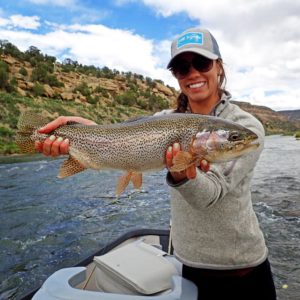










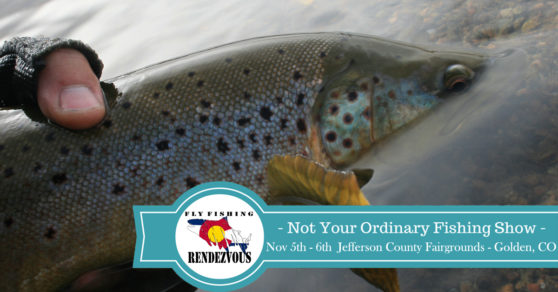
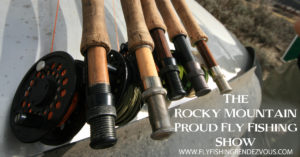
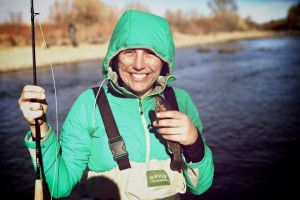 “It’s the consummate riddle that’s never solved, when you’re on the river and fishing,” said Barclay, a real estate agent with Slifer, Smith and Frampton who’s been moonlighting as a guide with Blue Quill Angler for more than a decade. “And it takes you to beautiful places. Just don’t wait for it to show up on your bucket list — get out there now.”
“It’s the consummate riddle that’s never solved, when you’re on the river and fishing,” said Barclay, a real estate agent with Slifer, Smith and Frampton who’s been moonlighting as a guide with Blue Quill Angler for more than a decade. “And it takes you to beautiful places. Just don’t wait for it to show up on your bucket list — get out there now.”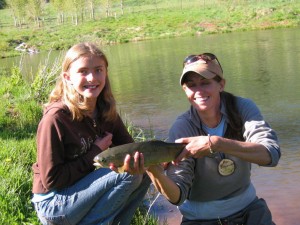 “A guide friend told me: ‘Have a river that you fish and know intimately, all times of the year and in all conditions,’” said Barclay, who travels north to the Bighorn at least four times per year. “So I followed what he said, and now I fish it in winter and summer, all year long, from low flows to high flows.”
“A guide friend told me: ‘Have a river that you fish and know intimately, all times of the year and in all conditions,’” said Barclay, who travels north to the Bighorn at least four times per year. “So I followed what he said, and now I fish it in winter and summer, all year long, from low flows to high flows.”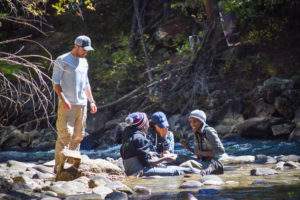 Forward Rising Inc, the creator of Forward Rising camp, is a new organization that focuses on engaging inner city girls through conservation, fishing, and the great outdoors. The organization hopes to use these activities to offer the girls outlets to the challenges they face.
Forward Rising Inc, the creator of Forward Rising camp, is a new organization that focuses on engaging inner city girls through conservation, fishing, and the great outdoors. The organization hopes to use these activities to offer the girls outlets to the challenges they face.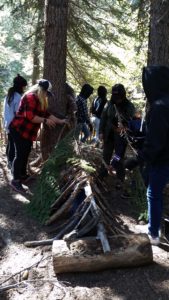 Saturday morning started out pretty chilly so everyone was moving a bit slower, but you could sense the excitement in the air! We kicked off our day with a session on wilderness survival from Mary Margaret Sweeney, PhD – Director at
Saturday morning started out pretty chilly so everyone was moving a bit slower, but you could sense the excitement in the air! We kicked off our day with a session on wilderness survival from Mary Margaret Sweeney, PhD – Director at 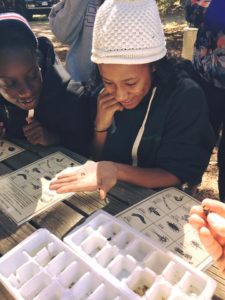 The girls suited up in waders and boots and headed to North Fork of the South Platte River to search for bugs. After turning over rocks and doing the “San Juan shuffle” in front of the bug seines we came away with a few bugs that would later be identified as mayflies, small craw-fish and a couple worms. After a lesson in entomology and discussions around the importance of healthy rivers we tied up some San Juan worms in hopes of tricking the fish!
The girls suited up in waders and boots and headed to North Fork of the South Platte River to search for bugs. After turning over rocks and doing the “San Juan shuffle” in front of the bug seines we came away with a few bugs that would later be identified as mayflies, small craw-fish and a couple worms. After a lesson in entomology and discussions around the importance of healthy rivers we tied up some San Juan worms in hopes of tricking the fish!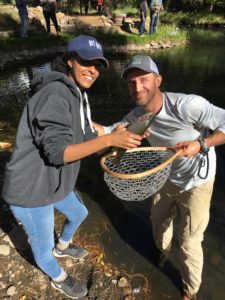 Sunday morning came faster than we expected and the weekend was coming to an end. The weekend contained many firsts – 1st time being in the river, 1st time putting up a tent and sleeping outside, 1st time catching a fish, 1st time making s’mores, 1st time seeing the stars and for some, 1st time being out of Denver. As we cleaned up camp and packed up the van there was still a lot of excitement about the weekend!
Sunday morning came faster than we expected and the weekend was coming to an end. The weekend contained many firsts – 1st time being in the river, 1st time putting up a tent and sleeping outside, 1st time catching a fish, 1st time making s’mores, 1st time seeing the stars and for some, 1st time being out of Denver. As we cleaned up camp and packed up the van there was still a lot of excitement about the weekend!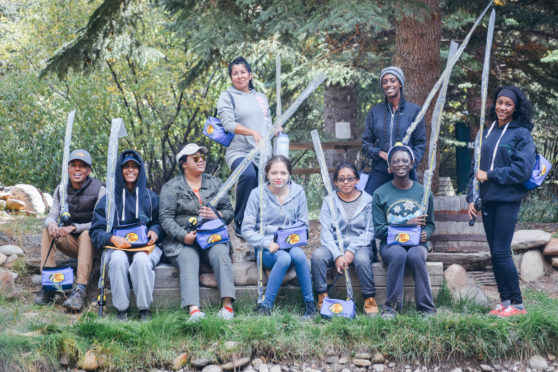
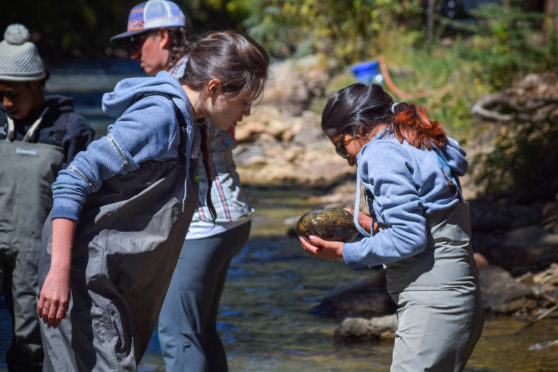
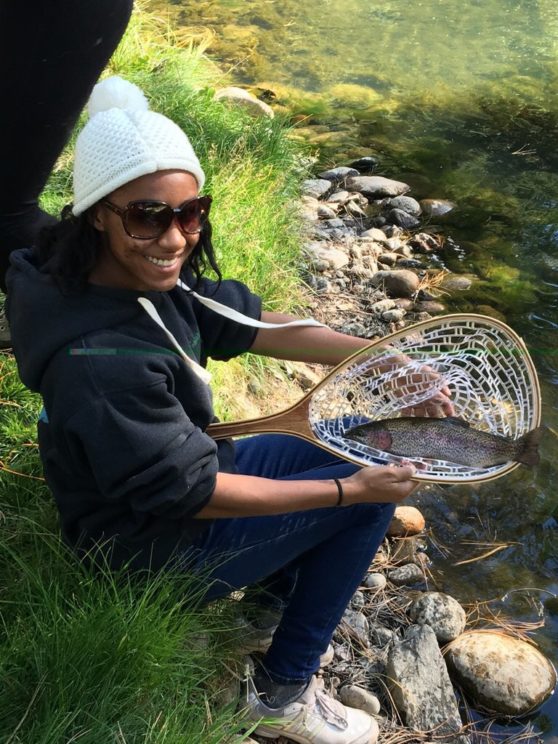
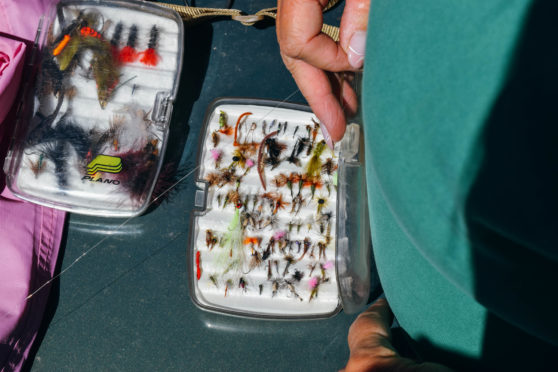
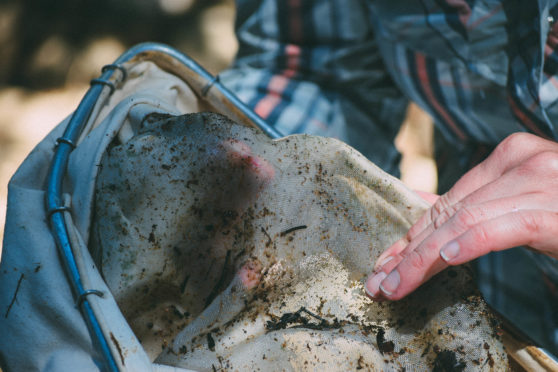
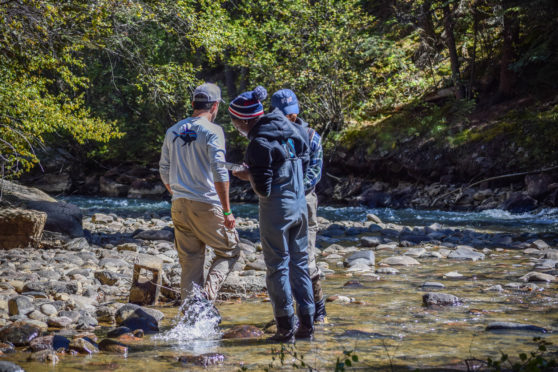
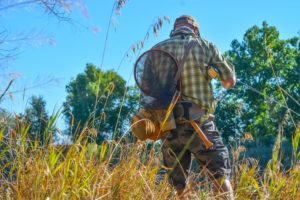 For the last 10 years, Denver Trout Unlimited has hosted the
For the last 10 years, Denver Trout Unlimited has hosted the  Chris Galvin, defending champion, hooked into one of the Mile High Stadium carp under the I-25 bridge and carefully moved it downstream in order not to disturb the pod. Ten minutes later, he tricked another for a masterful 2 fish within a few minutes. He added another only ten minutes before the morning session ended to take the lead going into the lunch break at Black-Black Cafe.
Chris Galvin, defending champion, hooked into one of the Mile High Stadium carp under the I-25 bridge and carefully moved it downstream in order not to disturb the pod. Ten minutes later, he tricked another for a masterful 2 fish within a few minutes. He added another only ten minutes before the morning session ended to take the lead going into the lunch break at Black-Black Cafe. Second place was snatched by Trevor Tanner and Kyle Richards. Third place went to the team of Frank Smethurst and rookie Vernon Naake with 3 fish for 70.38 inches.
Second place was snatched by Trevor Tanner and Kyle Richards. Third place went to the team of Frank Smethurst and rookie Vernon Naake with 3 fish for 70.38 inches.

